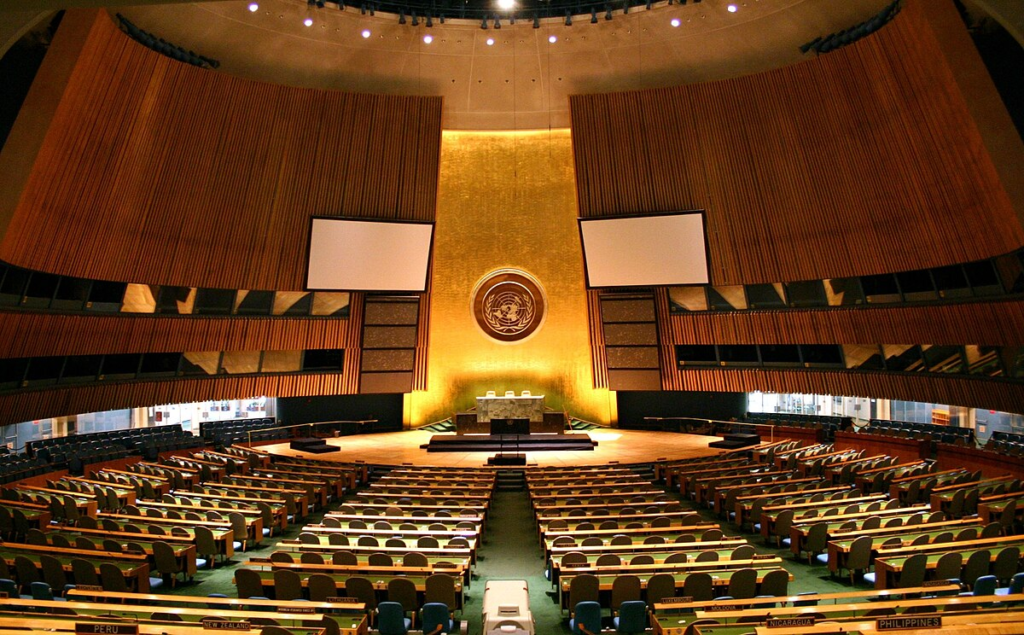Envisioning a Ceasefire and Beyond in Gaza

By: Ghassan Rubeiz / Contributing Writer
There are some strong signs that we are close to a ceasefire in Gaza. The votes in the United Nations Security Council on December 8 were telling. Israel does not have much more time to continue the military operation. Tel Aviv’s image in the world community has taken a hit. As pressure on the White House is growing, Biden has just announced his disapproval of Netanyahu and called for a new government in Israel.
UN Security Council Vote on Ceasefire
Out of the fifteen United Nations Security Council members, thirteen voted for an immediate ceasefire, the United Kingdom abstained, and the US used its veto power to block the resolution. Had the US joined the rest of the world in taking action to stop the unprecedented carnage, Netanyahu and his supporters in the Congress would have received a blunt message with real consequences.
US Domestic Challenges Sustain the War
President Biden, who is running for a second term, finds himself with limited political capital. Biden is momentarily preoccupied with critical legislative issues pertaining to new funding for Ukraine and Israel. He is also heavily burdened by a number of domestic threats, such as uncertainty of legislative approval of the national budget, increased incidents of public violence, campus unrest and chaos in the immigration policy.
Ethnic Cleansing Policy
The White House realizes that Israel cannot proceed much further in destroying Gaza without committing ethnic cleansing. If the bombing continues, the people of Gaza would be forced to seek survival, as refugees, in Egypt. And if the Israeli settlers of the West Bank continue to attack Palestinian civilians in their neighborhoods, it would become clear to the world that ethnic cleansing is not simply an accident of war; it would be recognized as a planned policy of the current Israeli government. Ethnic cleansing could easily start a regional conflict, which Washington is keenly trying to avert.
Excessive Retribution
Including missing people, the Israeli forces must have killed over 20, 000 and injured over 60, 000 in Gaza. The entire population is living under unlivable conditions. International pressure for a ceasefire is growing as scenes of carnage are displayed, hour by hour, on TV or internet screens and continue to be shown throughout the world. Regrettably, the US supplies Israel with massive weapons of mass destruction to try to resolve what is is primarily a political problem.
Unless Israel achieves a breakthrough in fighting, by managing to liquidate Hamas forces in the coming week or two, another UN General Council could then be passed unanimously. Facing a nod from Washington, Israel would then have no choice but to abide by the will of the international community. There would be no public support in Israel itself for a leader like Netanyahu to continue to challenge world opinion.
Hamas Loosing Gaza Control
Hamas’s leadership in Gaza seems to be ending, whether its forces are defeated or not. No Arab or foreign country would want to rebuild a future Gaza run by Hamas or occupied by Israelis forces. Regardless of what happens in the war, politically, Gaza will have to be reunited with the rest of the occupied Palestinian territories. Consequently, the focus should now be on the protection of those who have survived the war.
United Nations Force
Once a ceasefire is established, neither Hamas nor Israel should be allowed to fill the resulting political vacuum of governance in Gaza. No one knows exactly how the situation in post- war Gaza could be handled. Hopefully, an international force, preferably under the auspices of the United Nations, would assume the responsibility of Gaza governance. Jordan, Egypt and Morocco could be in a position to contribute manpower to the UN Force. If Israel plans to run a destroyed Gaza it will start a new set of unsettling political factors, which Tel-Aviv would not be able to manage. Morally, militarily and economically Israel would not be able to annex Gaza and push two million people across the border.
New Palestinian Leadership
A national election could determine the makeup of new Palestinian leadership. Through a democratic election, religious and secular groups could compete. If Palestine is to be liberated territorially, it must first be liberated through the ballot box. It will be vital to preserve the pioneering renaissance character of the resistance movement of Palestinians, by assigning the rebuilding of Gaza and the West Bank to promising political leaders, not to familiar warlords who have, for too long, divided the nation and squandered its resources. This may sound too aspirational, but if the leadership in Israel and future Palestine would realize that the security of both nations is interdependent, new promising possibilities would emerge.
A New Israeli Government
New ideas are desperately needed for physical and moral reconstruction. Responsible leaders are needed for restoring security to the fourteen million Palestinians and Israelis who live between the Jordan River and the Mediterranean. With the existing government, Israel would not be able to insure domestic order. This government was forced to set aside divisive, existential issues of identity and ideology, to deal with the war in Gaza.
A Historic Opportunity
Once a ceasefire is established, Israelis and Palestinians will find themselves back where they were before October 7. Up until October 6, both Palestinians and Israelis had been struggling with domestic divisions and external pressures. Israelis were divided on judicial reform issues on one level, and on how to deal with the occupation. Palestinians were divided between Hamas and Fatah; the former seeking liberation through Jihad, and the latter through secular resistance. This Gaza crisis has shaken the foundations of both Palestinians and Israelis. Since 1948, Palestinians have not come so close to being ethnically cleansed; now they are facing this threat. Since 1948, Israelis have been relatively comfortable with their existence; they are no longer that comfortable, given what is taking place in Gaza. Moreover, Israel’s future in co-opting religiously fanatic armed groups of settlers is risky. Regrettably, neither Israelis, nor Palestinians have given enough attention to the idea of coexistence spelled out in workable conditions.
Arab- Israeli Relations
When this Gaza war ends, the lessons learned will determine the success or failure of postwar restoration. Would cooler heads take charge in leading the healing, rehabilitation and state building for a future Palestine and for a secure Israel? Once open hostilities are halted in Gaza, leaders of the Arab Gulf seem open and willing to work with Israel, albeit in a new political context, where “Palestine” is central. There is no longer any doubt among most Arab leaders that coexistence with Israel is the only way to save the region from continued tension and turmoil.
The war in Gaza has fuelled anti-Semitic as well as anti- Islamic sentiments in the Middle East and abroad. The only way to restore trust between Arabs and Jews is through the engineering of political opportunities, where sharing experience and goals is mutually beneficial. I have in the past been very critical of the Abraham Accords; I am still very skeptical. But now, assuming that lessons have been learned, will the leaders of the Gulf be inspired to push for a regional peace initiative which would make it easier for Israel to negotiate with Palestinians on the possibilities of citizenship (one-state scenario) or separate statehood (two-state scenario)?
The Gaza war could either drive both sides apart or bring them to start thinking constructively. History has not manifested much learning from war. Could the fear of existential threats bring in a new way of thinking?
Ghassan Rubeiz is the former Middle East Secretary of the World Council of Churches. Earlier he taught psychology and social work in his country of birth, Lebanon, and later in the United States, where he currently lives. For the past twenty years, he has contributed to political commentary and delivered occasional public talks on subjects related to peace, justice, and interfaith. You can reach him at rubeizg@gmail.com
The views and opinions expressed in this article are those of the author and do not necessarily reflect the position of Arab America. The reproduction of this article is permissible with proper credit to Arab America and the author.
Check out Arab America’s blog here!








